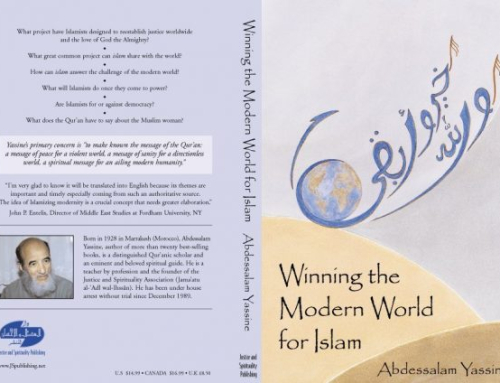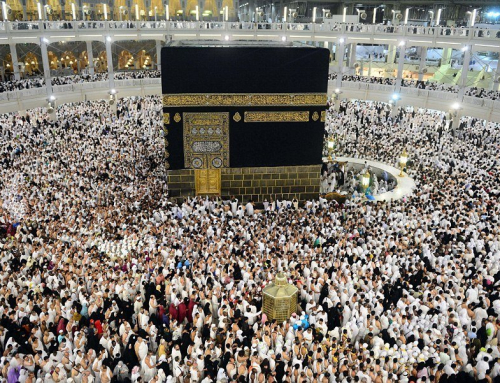Muhtar Holland
October 25, 2012
From the Book “The Muslim Mind on Trial: Divine Revelation vs. Secular Rationalism” by Imam Abdessalam Yassine
Translated from the Arabic by Muhtar Holland
Translator’s Foreword of the Book
WHEN I FIRST EMBARKED on this translation of Imam Abdessalam Yassine’s The Muslim Mind on Trial, I was already convinced that the work would be of considerable interest and value to many English-speaking readers, Muslims and non-Muslims alike. That was before the catastrophic events of September 11th, 2001. Since that date, we have witnessed an astronomical increase in what amounts to hunger and thirst for knowledge and understanding of Islam. In the courtroom where the trial of the Muslim mind is being conducted, the public gallery is now jam-packed each day, and the session lasts around the clock. The pro-ceedings are constantly broadcast by the media, so it is hard to turn on the radio or television without finding oneself involved in some aspect of the trial. Muslims from all walks of life are interviewed by reporters, in many countries and in various situations, in mosques and market-places, in homes and offices. . . . Panels of Muslim and non-Muslim scholars engage in discussions about Islamic beliefs and practices, the history of Islam and its relations with the West. Members of the public send in their questions and comments, by telephone, fax and e-mail. For authors of books on Islamic subjects, the advertising opportunities are unprecedented.
For obvious reasons, one question arises again and again and again, in private conversations and in public debates: “What is the truly Islamic view of terrorism?”
The reader is sure to wonder how Imam Yassine might answer that burning question. Let me therefore consult the work of a fellow trans-lator, who clearly has close affinity with the Imam. Martin Jenni trans-lated Imam Yassine’s Islamiser la modernité from French into English, under the title Winning the Modern World for Islam. (1) In his Translator’s Foreword, he describes the Imam as “the inspired Qur’anic scholar and beloved teacher.” In a note to his Foreword, he explains what the author means by the term “Islamist”:
“Islamist” . . . names an observant Muslim, someone whose life source is islam in the sense of submission to God. Such persons may well strive for the creation of a society guided by this principle, but it is a grievous (and often intentionally vicious) misuse of the term to represent a reli-gious fanatic or, worse still, terrorist.
In the media programs constantly aired these days, there is at least some recognition of the terrorism inflicted on Muslim peoples, in the form of ethnic cleansing, for instance. Imam Yassine is extremely forth-right in his condemnation of such atrocities. In The Muslim Mind on Trial, the reader will find numerous passages to that effect, notably the following:
The modern age is in crisis. Let us not be deluded by what others have built, such as scientific skyscrapers strewn all around. . . . For them, the human being has no meaning except the egoism of the strong, the waste-ful consumption of the wealthy, the pleasure of the rich and the death of the poor in the Somalia of starvation and civil war, or in the Bosnia of annihilation, savage slaughter and ethnic cleansing.
Does this mean that Muslims should respond by launching suicidal attacks against the skyscrapers of New York? Not according to Imam Yassine, for he goes on to say:
The Muslims are closely linked to the world as human beings. . . . We are the envoys of mercy, truth and justice for the world. . . . The choice of the free Muslim mind is that we should strive with all our efforts, so that, some day in the future if God will, we may lead the human caravan, while being fully aware of the content of our Message and duties toward human beings and all other creatures.
Let us now consider the book’s subtitle: Divine Revelation versus Secular Rationalism. Many readers are likely to be startled by his scath-ing disparagement of secular rationalism, while many will no doubt be mystified, at the outset, by the sovereignty assigned to Revelation (what-ever that may be!). Where the latter is concerned, the chapter entitled What Is Revelation? will surely prove invaluable. As for the sources and nuances of secular rationalism and its historical development, a splen-didly succinct account of the “isms” is provided in the chapter headed Dumps . . . and Dumps. However scathing he may be in his description of those “dumps” heaped upon the Muslims, Imam Yassine cannot be accused of exempting them from responsibility for their sick and im-poverished condition. In the chapter Comparison . . . and a Comparison, he lays that responsibility fairly and squarely on its fundamental cause:
Our illness is perpetuated and the servitude of our minds is reinforced, because we refuse to acknowledge our own faults. We take pleasure in criticizing others; we shy away from the duty of stern self-confrontation . . . [The human being] will not hear from us unless we remedy our faults, cure ourselves of our diseases and, through self-discipline first of all, gain virtues and strength.
At this point, I feel obliged to acknowledge my faults in rendering the author’s Arabic text into English. If those faults are fewer and less seri-ous than they would otherwise have been, the credit is due to my Mus-lim brother in Morocco, Farouk Bouasse, whose editorial feedback has been invaluable, as well as to my dear wife Nuraisjah, who listened with amazing patience while I read and re-read my work-in-progress. I must also express my gratitude to my Muslim brother in Iowa, Imad Ben-jelloun, who has served as my international courier at every stage, and to my dear daughter Aisah, whose electronic skills have kept me in touch with Imad.
May God bless the author, Imam Abdessalam Yassine, and may He enable the Muslim mind to emerge from its trial with flying colors.
References
| ↑1 | [1] |
|---|















